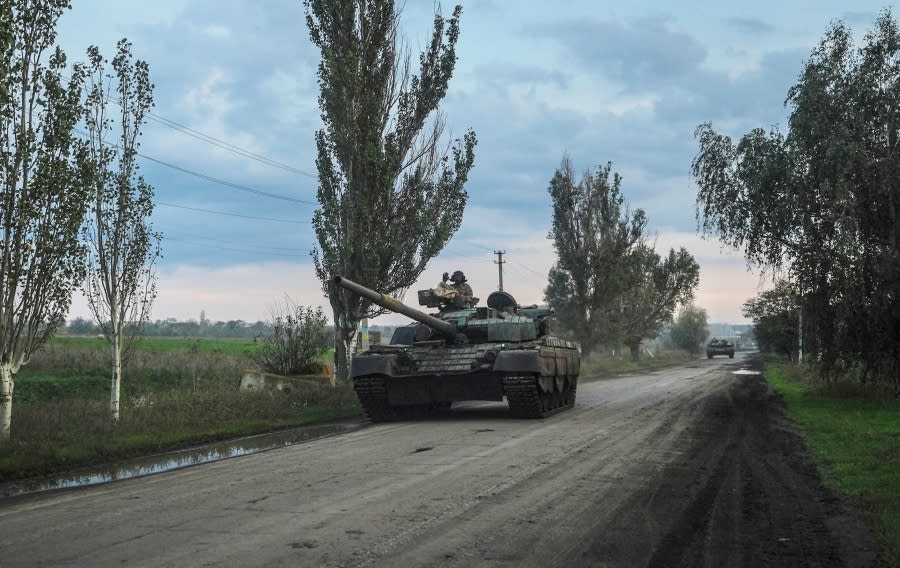
Ukrainian forces appeared to make gains over the weekend in areas Russia has recently claimed to annex, but U.S. and Western officials are on edge over Russian President Vladimir Putin’s recent threat to use nuclear weapons.
We’ll detail the recent wins for Ukraine and the U.S. assessment, plus, the start of the one of the most high-profile trials against those who stormed the Capitol on Jan. 6, 2021, the New Hampshire governor’s decision to deploy his state’s National Guard to the U.S.-Mexico border, and a U.S. airstrike in Somalia that killed a top al-Shabaab leader.
This is Defense & National Security, your nightly guide to the latest developments at the Pentagon, on Capitol Hill and beyond. For The Hill, I’m Ellen Mitchell. Subscribe here.
Ukraine breaks through Russian lines in key region
Ukrainian forces appeared to make gains over the weekend in Kherson Oblast, the latest pushback in areas Russia claimed to annex on Friday.
Ukrainian President Volodymyr Zelensky in his nightly address on Sunday said the country’s military liberated Arkhanhelske and Myroliubivka, small settlements located near the border of the region.
The U.S. assessment: “They are also making gains in the south, George, incremental to be sure, but they are making gains in their counteroffensive down in the south in the Kherson Oblast and not too far from the city of Kherson,” White House national security spokesman John Kirby told George Stephanopoulos on ABC’s “Good Morning America.”
“They’re absolutely on the move here,” Kirby continued. “And like you’ve heard President Biden saying, we’re going to continue to make sure we can give them the weapons and capabilities they need to continue that kind of progress.”
A major escalation: Russia annexed Kherson Oblast and three other regions of Ukraine on Friday, a major escalation in the seven-month war that was met with condemnations by U.S. and Western officials.
Ukrainian gains: Beyond the towns claimed by Zelensky, the Institute for the Study of War suggested Ukrainian forces also secured positions in Zolota Balka and Kreshchenivka, which are located in Kherson Oblast close to the Dnipro River.
“With numerically superior tank units in the direction of Zolota Balka and Oleksandrivka, the enemy managed to forge deep into our defenses,” said Igor Konashenkov, Russian Defense Ministry spokesman, during his daily briefing on Monday.
-
Ukraine has also appeared to regain control of Lyman, a key transportation hub in the country’s east that is part of a region Russia annexed.
-
The Ukrainian Defense Ministry on Sunday said the city is “fully cleared of the Russian occupiers” after videos posted to social media show Ukrainian soldiers making gains on the city and flying the Ukrainian flag after pushing out Russian forces.
The Pentagon’s view: A senior U.S. military official told reporters on Monday that the Ukrainians taking back Lyman was a “significant operational accomplishment,” because Russian troops were using the town as a logistics hub.
-
“It impacts the ability to resupply forces along the forward line of troops … in the Kharkiv region along down near Bakhmut and as far south as Kherson,” the official said.
-
They added that Russian forces pushed from Lyman appear to have fallen back towards the town of Kreminna “to hold the line.”
Recent gains…: Ukrainian forces made significant territorial gains in recent weeks as part of a counteroffensive, although those gains primarily occurred in Ukraine’s northeast as forces struggled to break through in the south near Kherson.
…And threats: The counteroffensive pushed back Russian forces to the border in some northeastern areas, causing embarrassment for Russian President Vladimir Putin, who responded by calling up 300,000 reservists and threatening the West with nuclear weapons.
More from The Hill:
Prosecutors lay out sprawling Oath Keepers case
Federal prosecutors on Monday laid out their sprawling case against Oath Keepers leader Stewart Rhodes and four other members of the far-right militia as it brings rarely used seditious conspiracy charges in one of its most high-profile trials against those who stormed the Capitol on Jan. 6, 2021.
-
Rhodes is on trial alongside Oath Keepers Kelly Meggs, Kenneth Harrelson, Jessica Watkins and Thomas Caldwell, each accused of conspiring to use force to overthrow the government — a crime that carries a sentence of up to 20 years in prison.
The accusations: “They concocted a plan for an armed rebellion to shatter a bedrock of American democracy,” Assistant U.S. Attorney Jeffrey Nestler told jurors at the U.S. District Court for the District of Columbia.
Nestler said the group broke a 200-year tradition and “banded together to do whatever was necessary, up to and including the use of force” to prevent the peaceful transition of power from former President Trump’s administration to President Biden’s.
A long-haul: Monday’s opening argument set the scene for a case expected to stretch for more than a month that will detail the two months of planning leading up to Jan. 6 and the days after, including direction from Rhodes to his followers to delete any incriminating evidence of their time in the Capitol.
Opening remarks: The government’s presentation showed Oath Keepers members undergoing training for the Capitol that day, showing messages from Watkins that she needed her crew to be “fighting fit.” Prosecutors also showed footage of the group using a “stack formation” to enter the Capitol and played messages of members bragging about making it into the building and tangoing with police.
Also from The Hill:
NH gov deploys National Guard to US-Mexico border
New Hampshire Gov. Chris Sununu (R) will deploy two units of his state’s National Guard to the U.S.-Mexico border on Monday afternoon, his office announced.
“New Hampshire is grateful for the heroic men and women of our National Guard,” Sununu said in a statement.
Sununu is the latest GOP governor to draw attention to border security after migrant encounters last fiscal year surpassed 2 million, hitting an all-time record.
-
Three Republicans — Arizona Gov. Doug Ducey, Texas Gov. Greg Abbott and Florida Gov. Ron DeSantis — have bused or flown migrants to Democratic-run cities in recent weeks to criticize the Biden administration’s border policies and share the burden felt by overwhelmed border communities.
-
Those efforts fueled fury among Democrats, who argue the relocations cruelly turn migrants into political pawns.
Deployment details: Sununu’s office said the deployment will comprise approximately 164 soldiers, who will conduct surveillance along the border but are prohibited from being in contact with migrants in the country illegally.
The National Guardsmen are instructed to notify Customs and Border Protection of border crossings they encounter.
Al-Shabaab leader killed in US airstrike: Pentagon
U.S. forces over the weekend conducted an airstrike in Somalia that killed a top leader of the al-Shabaab extremist group, the Pentagon said Monday.
In coordination with the Somali government, U.S. Africa Command (Africom) conducted the airstrike on Saturday, Oct. 1, near Jilib, roughly 370 kilometers southwest of Mogadishu.
-
Africom did not name the target of the attack, though the Somali Ministry of Information, Culture, and Tourism on Sunday identified the militant killed as Abdullahi Nadir.
-
Nadir, who the Somali government said had been wanted for a “long time,” had a $3 million U.S. bounty on his head.
The larger effort: The Somali government has announced a “total war” against al-Shabaab, which controls major swaths of land in the south and central parts of the country.
To help with that effort, President Biden in May announced 500 U.S. troops would be redeployed to Somalia to help train, advise and equip partner forces.
Saturday’s strike is at least the fifth since the beginning of August, with the most recent being on Sept. 18. In that strike, Africom claimed it killed 27 al-Shabaab terrorists who were attacking Somali forces.
ON TAP TOMORROW
-
The New Democrat Network will hold a virtual discussion on “The nature of America’s current conflict with Russia,” at 1 p.m.
-
Defense Secretary Lloyd Austin will welcome to the Pentagon Pakistani Gen. Qamar Javed Bajwa, chief of the Army staff, at 2:30 p.m.
-
U.S. Institute of Peace will hold a talk on “What Comes Next for Russia, Ukraine and Europe’s Peace and Security,” at 3 p.m.
WHAT WE’RE READING
OP-EDS IN THE HILL
That’s it for today. Check out The Hill’s Defense and National Security pages for the latest coverage. See you tomorrow!
For the latest news, weather, sports, and streaming video, head to The Hill.




